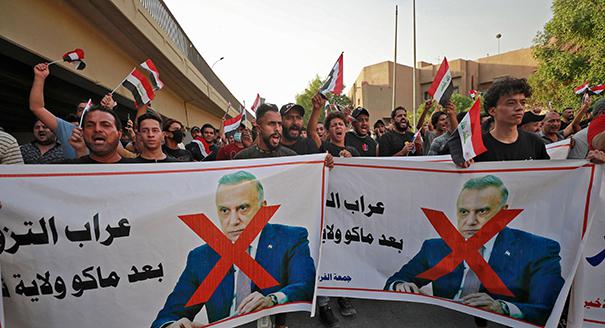Ali Hashem is a senior Al-Jazeera English correspondent who has long covered Iraq and Iran. He is also a research fellow at the Sectarianism, Proxies, and De-Sectarianization Project (SEPAD) based at Lancaster University. His research focuses on the Middle East, with an emphasis on Iran, Lebanon, and Iraq. Diwan interviewed Hashem to get his perspective on recent developments in Iraq, where Prime Minister Mustapha al-Kadhimi was the target of a drone attack on his home last week. The country has been caught in a deadlock since parliamentary elections in October, when the Popular Mobilization Forces lost a significant number of seats in parliament, to the advantage of Muqtada al-Sadr and the former prime minister Nouri al-Maliki. In the aftermath of the Kadhimi assassination attempt, Ismail Qaani, the head of the Quds Force of Iran’s Islamic Revolutionary Guard Corps, visited Baghdad to calm tensions between the different Shia factions.
Michael Young: Who tried to assassinate Iraqi Prime Minister Mustapha al-Kadhimi, and was it indeed an assassination attempt or a message to him? If so, what was the message?
Ali Hashem: There are several possible scenarios. Government sources say it was the pro-Iran militias, however without Tehran’s consent. The Shia factions are divided between those who accuse Kadhimi of setting up this attack to boost his chances of securing a second term in office and those who see the involvement of a third party that wants to create sedition among Shia groups. Circumstantial evidence suggests it’s one of the militias, but in a country like Iraq it’s risky to jump to conclusions without solid evidence.
MY: Many people speculated that Iran was somehow behind the attack on Kadhimi’s home. However, a few days ago Ismail Qaani, the head of the Quds Force of Iran’s Islamic Revolutionary Guard Corps, visited Baghdad and his remarks there appeared to point the finger at the Popular Mobilization Forces and indicated that Iran was unhappy with what had happened. Where does the truth lie here?
AH: Given the nature of the ties between Iran and Kadhimi and the role the Iraqi prime minister is playing in the dialogue between Iran, Saudi Arabia, and several Arab states, I don’t see why Iran would undermine Kadhimi’s power in this way. Iran understands well that when it comes to the Shia political establishment in post-Baath Iraq, its continuation in power lies at the heart of the struggle in the region. Iran would give up tactical gains for the strategic goal of the Shia remaining strong in Iraq, because the alternative would mean the country leaves Iran’s sphere of influence and transforms itself gradually from a national security asset into a threat.
MY: Do the Shia militias have independent control over armed drones, like the ones that targeted Kadhimi’s home?
AH: There is evidence that some factions have been functioning on their own since the assassination of Qassem Suleimani, the late head of the Quds Force, and of the deputy commander of the Popular Mobilization Forces, Abu Mahdi al-Muhandis. Over the past couple of years, these groups have pursued their own priorities and interests, mainly because they have become financially independent from Iran.
MY: How seriously did Iran take the electoral setbacks of the pro-Iran Popular Mobilization Forces in Iraq’s recent parliamentary elections? And how will it react?
AH: The Iranian ambassador to Iraq made it clear that Iran saw no evidence of fraud. This was a couple of days ago. It’s obvious that even if Iran has preserved its leverage in Iraq, including having a word in choosing a new prime minister, there is a serious problem within the Shia community and divisions over how Iran’s role is viewed in the country. The October 2019 protests, the ones before then, and the ones that followed, while they were partially related to internal grievances, also reflected anger with Iran and its behavior in Iraq. On several occasions Iranian consulates were set on fire, while anti-Iranian chants reflected how a segment of Iraqi society regards their country’s eastern neighbour. So it would be a surprise if Iran didn’t take this growing phenomenon into consideration. Even if there is no real regional competitor to Iran in Iraq, in the interim an infrastructure is being laid by Tehran’s rivals to challenge its power, and this is extending beyond the grassroots level.
MY: Was the poor showing of the Popular Mobilization Forces in the elections a sign of growing hostility in Iraq toward Iran?
AH: As I noted, there is indeed growing hostility. However, how can we explain that Nouri al-Maliki won around twelve more seats than in the previous election, when he’s known to be close to Iran. The Iranian factor in the election was there, but it wasn’t a game changer. The boycott by some groups and the failure of Shia groups to deliver to their constituencies affected the outcome. Even those who were close to the Americans and the West, such as former prime minister Haidar al-Abadi, lost more than what pro-Iran groups did, which underlines that the main factor here was the inability of Shia parties to satisfy the demands of their electorates.
MY: Moqtada al-Sadr was the big winner in the Iraqi elections, but he is also someone who has always avoided breaking with Iran. How do you see his relationship with Tehran developing in the coming months and years?
AH: Moqtada’s relation with Tehran has gone through several stages, but he was never in anyone’s pocket. He’s the only politician who has preserved his popular base and part of this is due to the trust his supporters have in him. Moqtada owns a home in Qom and is studying in the seminary there. He knows very well that without Iran he couldn’t have influence in Iraq; while having relations with Tehran opens up many opportunities. At the same time, he is hostile toward the Americans, an attitude he shares with the Iranians.






